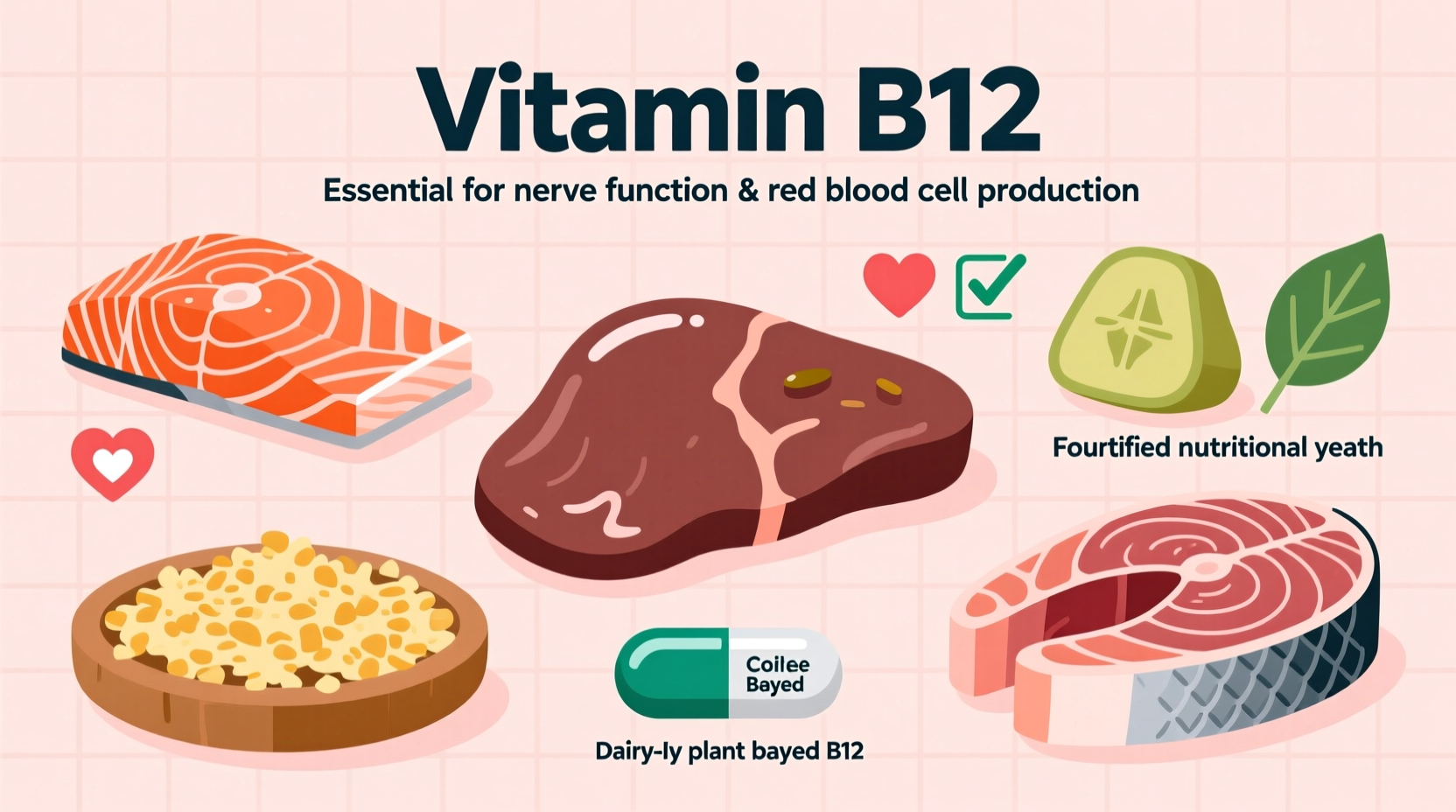The most reliable food sources of vitamin B12 are animal products including liver, clams, fish (like salmon and trout), beef, dairy products, and eggs. For vegetarians and vegans, fortified nutritional yeast, plant milks, and breakfast cereals provide essential B12. Adults need 2.4 mcg daily, with higher requirements for pregnant or breastfeeding women.
Discover exactly which foods deliver optimal B12 levels for your specific dietary needs—whether you're omnivore, vegetarian, or managing absorption challenges. This guide cuts through conflicting information with science-backed food choices that actually work for maintaining healthy B12 levels.
Why B12 Matters More Than You Think
Vitamin B12 isn't just another nutrient—it's essential for nerve function, red blood cell formation, and DNA synthesis. Unlike other vitamins, your body can't produce B12 naturally, making dietary intake critical. The National Institutes of Health confirms that deficiency affects 15-40% of adults over 60, often causing fatigue, memory issues, and neurological problems before blood tests detect it.
Your Complete Guide to Natural B12 Food Sources
Top Animal-Based B12 Powerhouses
Animal products contain the most bioavailable form of B12 (methylcobalamin). Here's what delivers maximum value:
| Food Source | Serving Size | B12 Content (mcg) | % Daily Value |
|---|---|---|---|
| Liver (beef) | 3 oz | 70.7 | 2,946% |
| Clams (cooked) | 3 oz | 84.1 | 3,504% |
| Salmon (wild) | 3 oz | 4.9 | 204% |
| Trout (rainbow) | 3 oz | 3.5 | 146% |
| Beef (lean ground) | 3 oz | 1.5 | 63% |
| Milk (whole) | 1 cup | 1.2 | 50% |
| Yogurt (plain) | 1 cup | 1.1 | 46% |
| Eggs (large) | 2 eggs | 0.9 | 37% |
Data sourced from NIH Office of Dietary Supplements and USDA FoodData Central. Note that cooking methods impact retention—steaming preserves more B12 than frying.
Plant-Based B12 Solutions That Actually Work
For vegetarians and vegans, natural plant sources of B12 are virtually nonexistent. However, these fortified options provide reliable alternatives:
- Nutritional yeast: Just 2 tablespoons of fortified nutritional yeast delivers 8 mcg (333% DV). Choose brands specifically labeled "fortified with B12" like Bragg's or Bob's Red Mill.
- Fortified plant milks: Almond, soy, and oat milks typically contain 1-3 mcg per cup. Check labels as formulations vary significantly.
- Breakfast cereals: Many contain 100% of daily B12 needs per serving. Look for "cyanocobalamin" in ingredients.
- Tempeh and nori: Contain trace amounts but should not be relied upon as primary sources according to the Academy of Nutrition and Dietetics.

Critical Context: Who Needs More B12 and Why
Not everyone processes B12 equally. These factors dramatically impact your requirements:
- Aging population: Over 30% of adults over 50 have reduced stomach acid, impairing B12 absorption from food (per Mayo Clinic). Older adults often need fortified foods or supplements.
- Gastric surgery patients: Those with gastric bypass require 500-1000 mcg daily supplements as they can't absorb food-based B12.
- Vegetarian/vegan duration: After 3+ years without supplements, deficiency risk increases 11-fold (American Journal of Clinical Nutrition).
- Medication interactions: Metformin and proton pump inhibitors reduce B12 absorption by 19-30%.
Practical B12 Optimization Strategies
Your 30-Day B12 Boost Plan
Implement these evidence-based approaches immediately:
- Monday-Wednesday: Incorporate 3 oz salmon or trout (providing 150%+ DV) into two meals
- Thursday-Friday: Substitute one dairy serving with fortified nutritional yeast (add to popcorn or pasta)
- Weekends: Try B12-fortified breakfast cereals with plant milk for complete coverage
When Food Isn't Enough: Recognizing the Limits
Despite eating B12-rich foods, certain conditions require medical intervention:
- Consistent fatigue despite adequate sleep
- Numbness or tingling in hands/feet
- Mood changes or memory problems
- Pernicious anemia diagnosis
In these cases, consult your healthcare provider about sublingual supplements or injections. The American Society of Hematology confirms that oral supplements at 1,000 mcg daily effectively treat deficiency even with absorption issues.
Common Questions About B12 Food Sources
Let's address the most pressing concerns people have about getting B12 from food:











 浙公网安备
33010002000092号
浙公网安备
33010002000092号 浙B2-20120091-4
浙B2-20120091-4